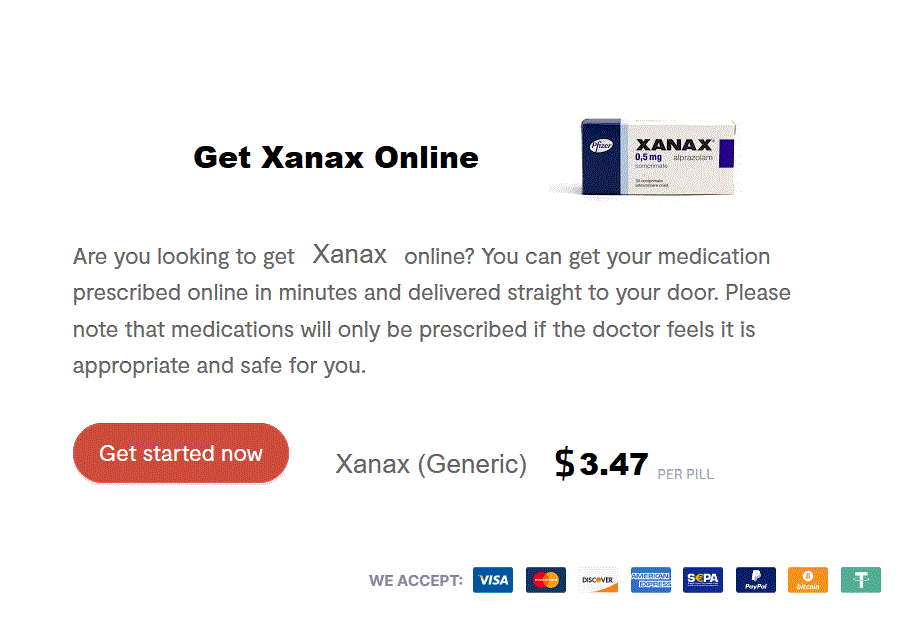Xanax over the counter
Xanax, also known by its generic name alprazolam, is a medication commonly prescribed to treat anxiety and panic disorders. Understanding how Xanax works in the body can provide insights into its effectiveness and potential side effects.

How Does Xanax Work in the Body?
Xanax belongs to a class of drugs called benzodiazepines, which work by enhancing the effects of a neurotransmitter called gamma-aminobutyric acid (GABA) in the brain. GABA is an inhibitory neurotransmitter that helps regulate brain activity and reduces excessive neuronal firing.
Drug Name: |
XANAX |
| Tablet Strength: | 1mg |
| Best Price: | $3.47 Per Pill |
| Payment: | Visa, MasterCard, PayPal, BTC |
Where to Buy XANAX Over The Counter? |
GET XANAX NOW |
When Xanax is ingested, it binds to specific GABA receptors in the brain, increasing the binding efficiency of GABA. This leads to an increased influx of chloride ions into neurons, resulting in a calming effect on the central nervous system. Essentially, Xanax enhances the inhibitory actions of GABA, which helps reduce anxiety symptoms and induce relaxation.
It’s important to note that Xanax should only be used as prescribed by a healthcare professional due to its potential for dependence and misuse. Additionally, prolonged use or abrupt discontinuation of Xanax can lead to withdrawal symptoms or rebound anxiety.
In summary, Xanax works by enhancing the effects of GABA in the brain, resulting in reduced anxiety levels and promoting relaxation. However, it’s crucial to follow medical guidance when using this medication due to its potential risks and side effects.
Common Uses of Xanax in Medical Practice
Xanax, also known by its generic name alprazolam, is a medication commonly used in medical practice for various conditions. One of the primary uses of Xanax is for the treatment of anxiety disorders. It is particularly effective in managing generalized anxiety disorder (GAD) and panic disorder.
For individuals suffering from anxiety, Xanax can help alleviate symptoms such as excessive worry, restlessness, and irritability. It works by enhancing the effects of a neurotransmitter called gamma-aminobutyric acid (GABA), which helps to calm the brain and reduce anxiety.
In addition to anxiety disorders, Xanax is also prescribed for the treatment of social anxiety disorder. Social anxiety can cause intense fear or discomfort in social situations and can significantly impact an individual’s daily life. Xanax can help manage these symptoms and improve overall functioning.
Furthermore, Xanax may be used as a short-term treatment for insomnia associated with anxiety. By promoting relaxation and reducing anxious thoughts, it can assist individuals in falling asleep faster and achieving better quality sleep.
It is important to note that while Xanax can be highly effective in managing these conditions, it should only be taken under the guidance of a healthcare professional. Due to its potential for abuse and dependence, it is typically prescribed for short-term use.
Overall, Xanax plays a crucial role in medical practice by providing relief to individuals struggling with anxiety disorders such as GAD, panic disorder, social anxiety disorder, and insomnia related to anxiety. However, it should always be used responsibly and as directed by a healthcare provider.
Precautions and Considerations when Taking Xanx Medication
When taking Xanax medication, it is important to follow the prescribed dosage guidelines and take necessary precautions to ensure safe and effective use. Here are some considerations to keep in mind:
- 1. Dosage Guidelines: Always follow the recommended dosage provided by your healthcare professional. Xanax comes in different strengths, and the appropriate dosage will depend on your individual needs and medical condition.
- 2. Avoid Alcohol and Other Substances: It is crucial to avoid consuming alcohol or other substances that may interact with Xanax while on therapy. Combining Xanax with alcohol or certain medications can increase the risk of side effects, such as drowsiness, dizziness, or impaired judgment.
- 3. Inform Your Healthcare Provider: Make sure to inform your healthcare provider about all medications you are currently taking, including prescription drugs, over-the-counter medications, herbal supplements, and recreational substances. Some medications can interact with Xanax and lead to adverse effects.
- 4. Medical Conditions: Inform your healthcare provider about any pre-existing medical conditions you have before starting Xanax therapy. Certain medical conditions may require adjustments in dosage or close monitoring during treatment.
- 5. Withdrawal Symptoms: Abruptly stopping Xanax can lead to withdrawal symptoms such as anxiety, insomnia, irritability, or seizures. It is important to gradually reduce the dosage under medical supervision when discontinuing the medication.
Remember that this information is not exhaustive and it is essential to consult with a healthcare professional for personalized advice regarding your specific situation when using Xanax medication.





